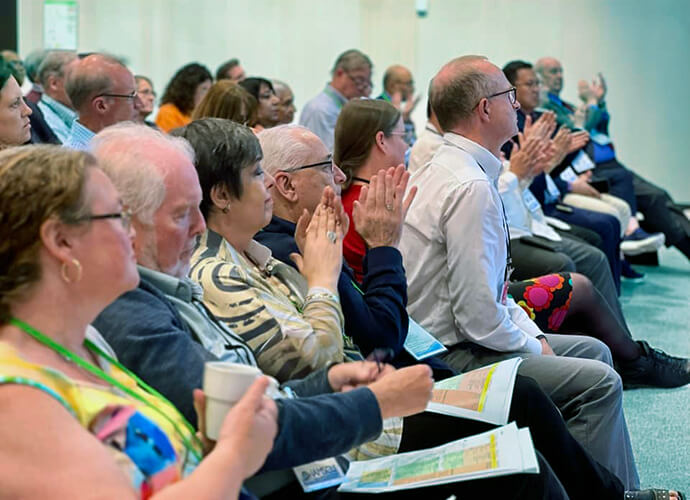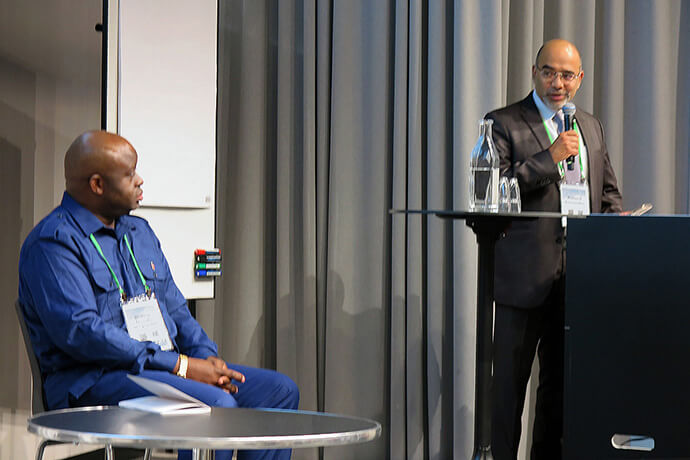Key points:
- Educators from across the Wesleyan tradition met just ahead of the World Methodist Conference in Sweden.
- While the gathering dealt with a variety of topics, much of the discussion dealt with the aftermath of the United Methodist General Conference.
- The scholars heard about some of the impact of ending restrictions around LGBTQ people as well as more about the proposed regionalization amendments now heading to United Methodist annual conference voters.
The Rev. Dr. Hilde Marie Movafagh did not know what to expect when for the first time, she and about 50 other Norwegian United Methodists marched in Oslo’s Pride Parade this year.
As the group stepped forward under the Cross and Flame, Movafagh was astonished to hear repeated shouts of “Yay, Methodists” erupting from the crowd. Two famous Norwegian comedians along the parade route also cheered on the churchgoers.
When the marchers reached the city center, Movafagh said, the event’s announcers joined in the celebration, proclaiming that the United Methodist General Conference had just ended the denomination’s decades-long bans on gay clergy and the officiation of same-sex weddings.
“They concluded with saying, ‘Thank you, Methodists,’ and you had thousands of people cheering for the Methodist Church,” Movafagh recalled.
“I don’t know about you. I’ve been a Methodist for 50 years. That’s all my life. I have never, ever experienced a crowd of several thousand people cheering for my denomination.”
Still amazed, Movafagh recounted her church’s joyous reception as part of a discussion on diversity and inclusion at a gathering of the International Association of Methodist Schools, Colleges and Universities.

The association — best known as IAMSCU — drew about 100 scholars and other leaders of Methodist-related institutions to a gathering Aug. 11-13 immediately before the ecumenical World Methodist Conference that brought together more than 1,000 representatives of Wesleyan-rooted denominations. Both events took place in the same hotel, Gothia Towers, in the city of Gothenburg, an important seaport on Sweden’s west coast and the fifth-largest city in the Nordic countries.
Both events also included a large contingent of United Methodists. At the IAMSCU meeting especially, many were eager to discuss the developments at the recent General Conference and what those actions might mean for their denomination’s future.
Holding the two events consecutively made sense. For the people called Methodist, learning and worship always have gone hand in hand. After all, no less a wordsmith than hymn writer Charles Wesley urged: “Let us unite the two so long divided, knowledge and vital piety.”
Dr. Amos Nascimento, IAMSCU’s executive secretary and treasurer, said that for him and other scholars, “Being here helps us tell our story to the church.”
The two gatherings also were truly international in scope with church leaders attending from six continents. Among the participants at both was the Rev. Charissa Suli, a Tongan native and the first person of color to serve as president of the Uniting Church in Australia.

Suli joined Movafagh on the IAMSCU panel to discuss the topic of diversity and inclusion.
In tackling what is a major source of discussion and at times controversy in both academia and the church, Suli said she found it important to draw upon the shared Methodist belief that God’s grace is for all people.
“I love that John Wesley had once said that ‘The world is my parish,’” she said. “This statement was not just a call to evangelize beyond the boundaries of church buildings but a profound recognition that every person is a child of God, deserving of dignity and respect and love.”
Movafagh, an IAMSCU board member, is a theologian who has long worked to promote that Wesleyan understanding of the Christian faith. The rector — the equivalent of dean — of The Theological Seminary of The United Methodist Church in Oslo, Norway, also has long advocated for LGBTQ people to be treated with dignity and welcomed into all aspects of the life of the church.
About IAMSCU
The International Association of Methodist Schools, Colleges and Universities started in 1991 at the World Methodist Conference in Singapore. Twenty groups joined in the beginning, and today the association has about 1,000 education institutional affiliates in more than 80 countries.
The United Methodist Board of Higher Education and Ministry has been a key partner in the association since the beginning. Staff from that agency and the United Methodist Board of Global Ministries provided support throughout the IAMSCU gathering. The two agencies now share a closer relationship and the same top executive, Roland Fernandes.
Also on hand were executive directors of Higher Education and Ministry's Leadership, Education and Development (LEAD) Hubs. The LEAD hubs keep The United Methodist Church connected with Methodist-related educational institutions in Africa, Asia, Europe as well as North and South America.
The IAMSCU meeting in Sweden followed up on its main conference last year. That meeting drew more than 400 scholars to the United Kingdom to celebrate the 275th anniversary of Kingswood School, founded by John Wesley.
But she acknowledged that even in Norway, which legalized same-sex marriage in 2009, the place of LGBTQ people remains a source of contention within the country’s varied Christian bodies.
“This issue splits churches at the moment, and that makes people change their denominations,” she said. “We see that go both ways. There are Methodists going over to more conservative denominations. Two of our churches became Pentecostal this summer. But we also have it the other way around with people from more conservative denominations considering becoming a Methodist.”
Movafagh said she thinks seminaries should not remain silent when the church experiences debate or even schism. Instead, she said seminaries have an obligation to share their theological work with the wider church.
After decades of seeing votes go the other way at General Conference on LGBTQ matters, she said, she and other like-minded Norwegian United Methodists are now reflecting on what it means to be in the new majority.
“It is the role of a majority, in any case, to make sure that the minority has space,” she said. “And now it was the former activists that have a position of making sure the conservatives can find their place in the church.”
She said she and other United Methodists want to create space for people of diverse theological perspectives and biblical understandings — but not at the expense of the well-being of the LGBTQ community.
“I think we should aim to be a better majority,” she said, “a majority that practices diversity, that defends the other people’s freedom of speech, as long as you do not do harm to anyone.”
The official theme of the IAMSCU meeting was “Community, Conciliation, and Connectionalism.” An overarching idea throughout the scholars’ conversations was their desire to move church relations from the exploitation of colonialism to the equality and mutuality of true connection.
That is the aspiration behind the proposal for regionalization — another change moved forward by General Conference and now heading to United Methodist annual conference voters. To come to fruition, the regionalization amendments to the denomination’s constitution will need at least two-thirds of the total annual conference votes.
North Katanga Area Bishop Mande Muyombo, who leads United Methodists in parts of Congo and Tanzania, explained the regionalization plan and its long history during the IAMSCU meeting and later at the World Methodist Conference.
Muyombo is a scholar as well, previously serving as president of Kamina Methodist University in Congo. He is currently the chair of the Connectional Table, a United Methodist leadership body that helped develop the plan for regionalization. He oversees the largest United Methodist episcopal area, with more than 1 million members.
Subscribe to our
e-newsletter
Under regionalization, The United Methodist Church in the U.S. and the central conferences in Africa, Philippines and Europe will each become regional conferences with the same authority to adapt certain parts of the Book of Discipline, the denomination’s policy book.
He noted that misinformation has spread equating regionalization with loosening restrictions around homosexuality, but that’s not true. Under regionalization, each region will be allowed to set its own policies around clergy qualifications and marriage rites.
Instead, he sees regionalization as a way of fulfilling Christ’s mandate in Matthew 28:18-20 to “make disciples of all nations, baptizing them in the name of the Father and of the Son and of the Holy Spirit.”
In short, regionalization will allow for greater missional effectiveness within the different countries and cultures within The United Methodist Church.
“Regionalization creates relevance and equity across the church without privileging one region as the center or others as peripheries,” he said.
The Rev. Dr. Connie Semy P. Mella is another proponent of regionalization. She is a dean and professor at Union Theological Seminary in the Philippines. She also works with the United Methodist Board of Higher Education and Ministry in guiding theological education across the Philippines and Southeast Asia. She is a leader in the World Methodist Council.
She noted that many in the Philippines Central Conference have long championed what The United Methodist Church calls regionalization.
“For many years, we have been calling for affiliated autonomy, which is the essence of worldwide regionalization,” she told United Methodist News. “It stands for self-identity, contextualized polity and relevant ministry.”
The Rev. Dr. Roger Ireson, who helped found IAMSCU when he was the top executive of the United Methodist Board of Higher Education and Ministry, said it was the sense of connection across the Methodist family that made the association possible.
“Connectionalism is friendship,” said Ireson, who is now retired.
“I think when connectionalism is seen as more than just a system, but as the result of friendship with a goal of accomplishment, it can do great things.”
Hahn is assistant news editor for UM News. Contact her at (615) 742-5470 or newsdesk@umcom.org. To read more United Methodist news, subscribe to the free Daily or Friday Digests.



